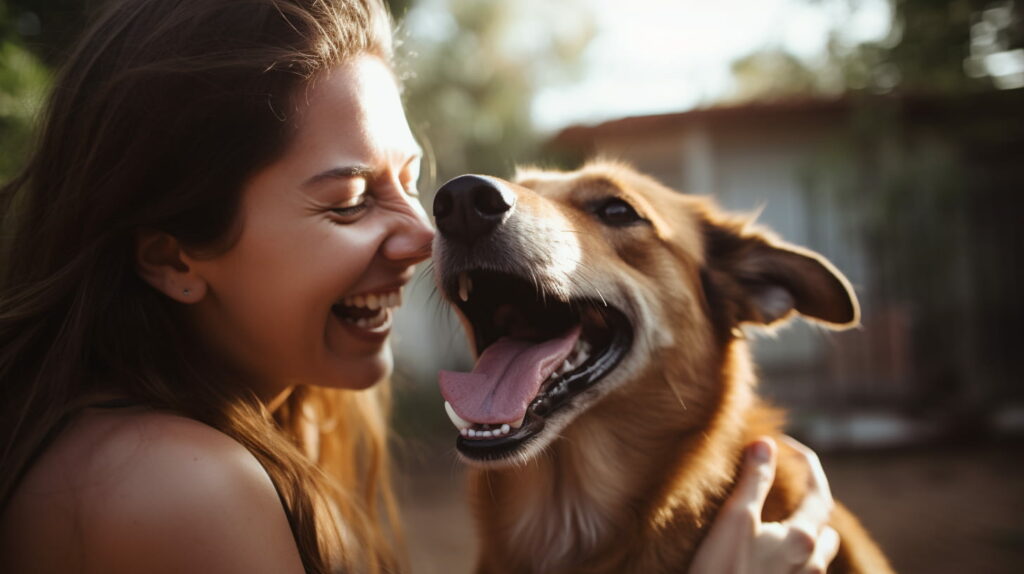Have you ever wondered why your furry friend insists on giving your ears a thorough licking every chance they get? It's a common behavior exhibited by many dogs, but the reasons behind it may not be readily apparent. In this article, we will explore the various reasons why dogs lick their owner's ears and what it means for your relationship with your furry companion.
As pet owners, we know that our dogs have unique personalities and ways of communicating with us. Understanding their behavior and what motivates it can help us develop a closer bond with them. So, why exactly does your dog lick your ears?

Key Takeaways:
- Dogs lick their owners' ears for a variety of reasons, including communication, bonding, grooming, and sensory stimulation.
- Ear licking can also be a sign of underlying health concerns, such as ear infections or discomfort.
- If you find your dog's ear licking behavior excessive or concerning, consult with a veterinarian or a dog behaviorist for professional help.
Canine Communication: Licking as a Means of Expression
As social animals, dogs have evolved an intricate communication system that involves vocalizations, body language, and olfactory cues. Among these forms of communication, licking is a behavior that dogs use to express a range of emotions and intentions.
At a basic level, dogs may lick as a way of soliciting attention or affection from their owners. They may also lick to signal a desire for food or water, or to indicate that they need to go outside.
However, licking can also convey a more complex set of messages. For example, a dog may lick to demonstrate submission to a more dominant animal, or to show deference to a higher-ranking member of its pack.
Canine Communication: Licking as a Means of Expression
In addition to these more practical uses, dogs may also lick as a way of expressing their emotional state. For example, a dog that is feeling anxious or stressed may lick excessively as a self-soothing behavior, while a dog that is feeling happy or relaxed may lick as a way of showing contentment.
It is important to note that not all dogs use licking in the same way, and the meaning of this behavior can vary depending on the individual animal and its social context. For this reason, it is important to observe your dog's behavior carefully and to seek professional advice if you are concerned about any aspects of his or her communication.
Overall, understanding how dogs use licking as a means of expression can help you to better communicate with your furry friend, and to strengthen the bond between you. Whether your dog is trying to signal affection, submission, or anxiety, paying attention to his or her licking behavior can help you to respond appropriately and to foster a deeper connection.
Bonding Rituals: Licking as a Sign of Affection
Dogs are social animals known for their loyalty and affection towards their human companions. From wagging tails to wet kisses, dogs have a unique way of expressing their love. One of the ways dogs show affection is through licking, which is considered a bonding ritual.
The act of licking releases endorphins in dogs, which makes them feel happy and relaxed. When a dog licks your ears, they are essentially grooming you and placing their trust in you. This behavior is often seen in dogs that consider their owners as part of their social group or pack.
Furthermore, licking has been observed to be a form of apology or appeasement in dogs. If a dog senses that their behavior has caused upset or distress, they may lick their owner's ears as a way of saying sorry or seeking forgiveness.
As a dog owner, it's important to recognize this behavior and respond appropriately to strengthen the bond between you and your furry friend. By petting them, cuddling them and returning the affection, you are telling your dog that their affection is returned, which further reinforces their behavior.
Grooming Instincts: Mimicking Canine Behavior
Dogs have a strong innate grooming instinct that is often exhibited within their canine social groups. Licking is one way they mimic this behavior with their human families.
When dogs are puppies, their mothers groom them as a way of bonding and fostering social connections. Grooming also serves a practical purpose of removing dirt and debris from their fur, ensuring they stay clean and healthy. Puppies emulate this behavior as they learn and grow, carrying it on into adulthood as a way of soothing themselves and establishing social connections with other dogs.
When your dog licks your ears, they may be engaging in this same grooming behavior, attempting to show you affection and strengthen the bond between you.
Sensory Stimulation: The Taste and Smell of Earwax
One possibility for why dogs lick their owners' ears is the taste and smell of earwax. Dogs have a heightened sense of smell and taste compared to humans, and earwax may be particularly appealing to them.
In addition, dogs may use licking as a way to gather information about their environment. They may be trying to learn about their owner's health or emotional state by analyzing the chemical compounds present in earwax.
However, it's important to note that excessive licking of the ears can be a sign of an underlying health issue, such as an ear infection or inflammation. If you notice your dog constantly licking their ears, it's recommended to schedule a veterinarian appointment to rule out any medical concerns.
Health Concerns: Ear Infections and Discomfort
While ear licking behavior is generally harmless, it can occasionally be a sign of underlying health issues. One common health concern is ear infections, which can be caused by bacteria, yeast, or allergies.
If your dog is licking their ears excessively, it may be an indication of discomfort or pain caused by an ear infection. Other signs may include scratching or rubbing their ears, redness or swelling, and a foul odor.
If you suspect your dog has an ear infection, it is essential to consult your veterinarian. They can diagnose the infection and provide appropriate treatment, which may include antibiotics or ear drops.
Additionally, ear licking behavior can be caused by other health issues, such as allergies or skin irritations. Your veterinarian can also help determine if these underlying health concerns may be contributing to your dog's ear licking behavior and provide guidance on how to address them.
Preventing Ear Infections and Discomfort
Preventive measures can help reduce the likelihood of ear infections or discomfort caused by other health concerns. Regular ear cleaning can help remove excess wax and debris, preventing buildup that can lead to infections. Your veterinarian can recommend an ear cleaning solution and provide guidance on how to clean your dog's ears properly.
Regular veterinary checkups are also crucial for maintaining your dog's health. During checkups, your veterinarian can examine your dog's ears and identify any potential health concerns before they become serious issues.
Training and Boundaries: Reducing Ear Licking Behavior
If you find your dog's ear licking behavior excessive or undesirable, it's essential to establish training and boundaries. Before you begin, keep in mind that dogs respond best to positive reinforcement and consistency, and punishment should be avoided. Here are some tips and techniques to help reduce your dog's ear licking behavior:
- Distract and redirect: When you notice your dog licking your ears, gently redirect their attention to a toy or chew, or ask them to perform a command they know well, such as "sit" or "stay." Reward them with praise and treats when they follow through.
- Teach the "off" command: Training your dog to understand the "off" command can be helpful in situations where they display unwanted behavior, including ear licking. Use a treat to lure them away from your ears while firmly saying "off." Once they move away, reward them with praise and treats.
- Create physical boundaries: If your dog persists in ear licking despite your efforts to redirect them, consider using a physical barrier, such as a baby gate, to separate them from you temporarily.
Remember, consistency is key when training your dog. Ensure that all family members enforce the same boundaries and provide consistent training to achieve results. Celebrate your dog's successes and reward good behavior with plenty of praise and treats!
Seeking Professional Help: Consulting a Veterinarian or Dog Behaviorist
If you find your dog's ear licking behavior concerning or excessive, it may be time to seek professional help. A veterinarian or dog behaviorist can help identify any underlying health concerns or behavior issues that may be causing the behavior.
If your dog's ear licking is accompanied by other concerning signs, such as shaking their head or scratching their ears, it could indicate an ear infection or discomfort. In this case, a veterinarian can examine your dog's ears to determine the cause of the issue and provide treatment.
If the ear licking behavior is a result of a behavior issue, a dog behaviorist can help you develop a training plan to discourage the behavior and set appropriate boundaries for your dog.
It's essential to seek professional help if you're not sure how to address the behavior, as it may be a symptom of a more significant problem. With the right support and guidance, you can cultivate a positive and healthy relationship with your furry friend.

Preventive Measures: Ear Care and Regular Checkups
Proper ear care is essential for your dog's overall health and well-being. Regular ear cleaning can help minimize the likelihood of ear infections that may lead to excessive ear licking. Begin by inspecting your dog's ears for signs of redness, discharge, or foul odor, which may indicate an ear infection.
When cleaning your dog's ears, use a veterinarian-recommended solution and cotton balls or gauze pads. Avoid using cotton swabs, which can push debris further into the ear canal and damage the eardrum. Gently swab the visible parts of the ear, and avoid inserting anything deep into the ear canal.
In addition to regular ear cleaning, routine veterinary checkups can help identify potential health concerns early on. During these checkups, your veterinarian may examine your dog's ears for signs of infection or other issues.
To ensure your furry friend's optimal health, schedule regular veterinary checkups and follow the recommended ear care guidelines. By doing so, you can minimize the risk of ear licking related to health issues and maintain your dog's well-being.
Conclusion
Understanding your dog's behavior, such as ear licking, is crucial in building a stronger and healthier relationship with them. By recognizing the various reasons behind ear licking, such as communication, bonding, grooming, sensory stimulation, and health concerns, you can respond to your dog's needs appropriately.
If you find your dog's ear licking behavior excessive or concerning, there are various training techniques and preventive measures you can take to address the issue. Additionally, consulting a veterinarian or a dog behaviorist may be necessary in some cases.
Overall, taking care of your dog's ears through regular veterinary checkups and cleaning can ensure their well-being. By understanding and addressing your dog's ear licking behavior, you can deepen the bond between you and your furry companion while promoting a happy and healthy life for them.
FAQ
Q: Why does my dog lick my ears?
A: Dogs lick their owners' ears for various reasons, including communication, bonding, mimicking canine behavior, sensory stimulation, and potential health concerns.
Q: How do dogs use licking as a means of expression?
A: Licking is one of the ways dogs communicate with their owners. It can convey messages such as affection, submission, or seeking attention.
Q: Is licking a sign of affection in dogs?
A: Yes, many dogs use licking as a bonding ritual and a sign of affection. It helps strengthen the bond between the dog and their owner.
Q: Why do dogs mimic grooming behavior by licking?
A: Dogs have an innate grooming instinct, and they may lick their owners' ears to mimic the behavior they would typically exhibit within their canine social groups.
Q: Does the taste or smell of earwax motivate dogs to lick ears?
A: Dogs' sense of smell and taste can play a role in their inclination to lick ears. The taste and smell of earwax may be appealing to them.
Q: Can ear licking be a sign of underlying health issues?
A: Yes, ear licking can sometimes indicate an underlying health problem, such as an ear infection or discomfort. It's essential to monitor your dog's behavior and consult a veterinarian if needed.
Q: How can I reduce my dog's ear licking behavior?
A: This section offers insights on training techniques and setting boundaries to discourage excessive ear licking in dogs.
Q: When should I seek professional help for my dog's ear licking behavior?
A: If your dog's ear licking behavior persists or is accompanied by other concerning signs, it's advisable to consult a veterinarian or a dog behaviorist for professional assistance.
Q: What preventive measures can I take to reduce ear licking behavior?
A: Taking care of your dog's ears and having regular veterinary checkups can help prevent ear licking behavior caused by health issues.


